Residents not hopping back on Mississauga transit buses as quickly as City would like
Published November 18, 2021 at 5:38 pm

Ridership on MiWay transit buses isn’t rebounding from the huge drop-off caused by the COVID-19 pandemic as quickly as City of Mississauga officials had hoped.
And City number-crunchers who participated in a budget media session earlier today say that decline in revenue is one of the financial pressures they’re facing in tabling the City’s proposed 2022 budget and financial plan for the next three years.
City Manager Paul Mitcham said 2022 “promises to be another challenging year with COVID (and) we will see additional losses…on transit ridership. Transit ridership is coming back, but not as quickly as we would like.”
As of September, MiWay was carrying some 61 per cent of pre-pandemic ridership, with the majority of loss coming from the express and community-based local routes, according to a City budget report.

But routes along industrial corridors “remain steady and strong,” the report added.
This past summer, ridership numbers had plummeted by more than half, so City officials are hoping the upward trend continues.
The City has frozen regular MiWay fares for this year and next, and the transit provider is “reviewing current fare products to create a fare strategy that will encourage customers to get back on the system,” the budget report states.
“Whether it’s MiWay, the TTC or GO Transit, we’re all looking at the numbers,” said Mitcham, adding ridership figures in Mississauga and across southern Ontario are expected to return over the course of years, not months.
“In my mind, transit will come back, but it’s going to take some time. There’s still a fear of COVID, there are many people who want to continue to work from home, so it’s going to take some time for that to sort out.”
To help offset transit losses, which were estimated earlier in the fall at about $7 million each month, it’s crucial Mississauga continues to receive stopgap funding from provincial and federal governments.
Under the Safe Restart Agreement, Mississauga and other municipalities receive millions of dollars from Ontario and Ottawa to offset transit shortfalls.
The City has four budget committee meetings scheduled in the next two weeks. At those sessions, councillors will consider staff’s proposed financial plan before it goes to City Council for approval.
Staff is recommending a 1.5 per cent residential property tax hike for 2022 on Mississauga’s portion of the tax bill. The Region of Peel, which has not yet approved its 2022 budget, is proposing a 1.6 per cent hike, which translates to an average annual increase of $78 for residents.
insauga's Editorial Standards and Policies advertising





